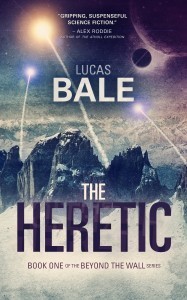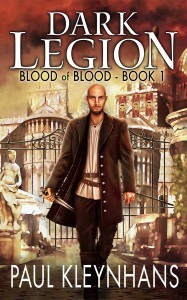Cora Buhlert's Blog, page 116
August 9, 2014
Odds and Ends
This blog had been rather quiet these past few days, since I haven’t been feeling well. However, there are some news from elsewhere to report:
For starters, I am now a contributor to the Speculative Fiction Showcase where the “Indie Speculative Fiction of the Month” feature will be crossposted on the last day of every month.
What is more, Kobo’s own e-book discovery platform Kobo Next just launched in German, featuring my own Die Liebe in den Zeiten des Frischkornmüslis among others.
 Send to Kindle
Send to Kindle
August 2, 2014
Plane Crash in Bremen
This has certainly been a summer of disasters in general and plane crashes in particular. First Malaysian Airlines flight MH17 was shot down in Ukraine, which rattled me a lot, because my Dad has flown the very same route only a few weeks ago. Then a TransAsia flight crashed in Taiwan, an Air Algerie flight in Mali and a private plane crashed into a supermarket parking lot in San Diego, all within the span of less than a month.
Yesterday at noon, Bremen was hit by an airplane disaster when a small plane crashed into a warehouse shortly after taking off at Bremen Airport, killing both people on board. Luckily, no one was hurt on the ground, because the plane hit a tyre warehouse on the premises of a car dealership rather than the showroom or the workshop, both of which would have been full of people. The crash site burned for several hours though, some homes in the area were evacuated and there was a smoke plume over Bremen.
Radio Bremen and Weser Kurier have more (in German). Here is also a report from the local news program buten und binnen (Outside and inside in Low German) with lots of footage and interviews with spokespeople of the Bremen police and fire brigade as well as two apprentices at the car dealership. Here is another buten und binnen clip interviewing a spokesperson of the German flight safety agency. Finally, here is a follow-up report from today with footage of the burned out crashsite and an interview with the owner of the car dealership.
The cause of the crash is not yet known, though the pilot apparently reported problems directly after the start and witnesses report that the plane was burning before it crashed. It is suspected that he tried to turn the plane around and crashed before he could reach the airport. The crash site is only a few hundred meters behind the North-Eastern end of the runway.
The plane was a Saab 91 Safir from 1954, which was owned and operated by the Lufthansa commercial flight school. The plane was about to go out of service and would have been transferred to the Lufthansa museum in Berlin later this month. There has been no official confirmation about the identity of the two people inside the plane, but the current word is that they were an experienced Lufthansa pilot and an Italian journalist.
This whole thing was something of a shock to me, because I know the neighbourhood where the plane crashed very well. The plane managed to crash right next to the intersection of two busy roads, which are main routes into the city centre and where I drive along all the time. My aunt and uncle live within walking distance of the crash site. A gentleman I know via my translation work lives literally next door. And just two days before the crash, I had lunch with my Mom at a café opposite the crash site. So it’s kind of obvious that I’m a bit rattled.
It didn’t help either that I heard the planes passing over my house all afternoon. I live under one of the flight paths from Bremen airport, though far enough out that the planes are audible, but not annoying. Apparently, yesterday they diverted all air traffic to the path that leads over my house to avoid the smoke plume. The airport was even closed for a while and a few flights had to be diverted to other airports. Mind you, all this happened on the busiest travel weekend of the year, because the summer holidays in Bremen and Lower Saxony started the day before.
The truth is that horrible as the deaths of the pilot and the passenger of the doomed plane are, it could have been much worse, is the plane had hit the showroom or the workshop of the car dealership or the ethnic supermarket behind the crash site or the houses nearby or the two busy roads intersecting next to the crash site or 24-hour gym and shoe shop on the other side of the road or the popular café opposite the crash site (the café is a wooden building, too) or the Airbus plant right next to the airport or the various office buildings that sprung up at the airport in the 1990s. Not to mention plenty of residential areas and several shopping malls and schools underneath the flight path. For example, my school was under the flight path as well and the planes were still so low and so loud that when the windows were open, we had to interrupt the lesson until the plane has passed. There was a particular Ryan Air flight which regularly interrupted my English class. In fact, it’s a stroke of luck in the middle of a bad case of misfortune that there weren’t more casualties yesterday.
As with all tragedies of this sort, you get the usual suspects airing their views. The delightfully named “Association for those damaged by air traffic”, actually just a bunch of people who bought cheap real estate near the airport and now wish that it would stop operating except for the two weeks they are on holiday, is already yelling and in the comments at a national news site, people were calling for banning all amateur pilots, totally disregarding the fact that the plane was not piloted by an amateur at all, but by an experienced Lufthansa pilot. As for the flight school connection, the Lufthansa flight school has been operating at Bremen Airport for more than fifty years without incident.
Here are a few facts: Bremen Airport opened for business in 1920, i.e. it is 94 years old. The first commercial connection was a flight to Amsterdam, operated by KLM. 94 years later, this same service still exists, though the planes are very different. Parts of the original 1920 Art Deco terminal building were still visible until a remodelling in the 1990s by the way. What is more, in those 94 years, the city grew and moved a lot closer to the airport. In fact, some of the residential buildings in the area were built in the 1920s and 1930s, i.e. not long after the airport. Would it have been more prudent to build the airport somewhere else? Probably. But the airport is where it is and relocating it elsewhere isn’t possible for a variety of administrative reasons too complicated to go into right now.
Besides, in its 94-year-history, Bremen Airport only experienced three crashes. The first was the Lufthansa flight 005 crash in 1966. The plane missed the runway, probably due to low visibility and heavy rain, and crashed into a field on the South-Western end of the runway, killing all 46 aboard, including actress Ada Tschechowa and several members of the Italian Olympic swimming team. I still remember that there was the burned out ruin of a barn at the site of the 1966 crash well into the early 1980s, until they extended the runway and relocated the road.
The second crash happened in 1972, when a prototype VFW-Fokker 614, which was being built in what is now an Airbus plant right next to the airport, crashed onto the airfield, killing the co-pilot. For some reason, this crash is almost completely forgotten, probably because it did not involve a plane in active passenger service.
The third crash, finally, happened yesterday, 42 years after the previous one. Not too bad considering that Bremen Airport is used by approx. 2.6 million passengers per year.
By the way, my Dad managed to drive past the sites of both the 1966 and 2014 crash just minutes after they happened. In both cases, he later said, “There was a fire. I had no idea what had happened.”
Finally, even living far from any airports is no guarantee that you won’t be affected by a planecrash. I bet the people of Eastern Ukraine (not the separatists, the ordinary farmers in the region) did not exact to find airplane parts and bodies raining onto their fields and villages. The people of the Scottish village of Lockerbie certainly did not expect to have an airplane dropped onto their heads (and the Pan-Am bombing also killed eleven people on the ground).
 Send to Kindle
Send to Kindle
July 30, 2014
Indie Speculative Fiction of the Month: July 2014
 It’s that time of the month again, time for “Indie Speculative Fiction of the Month”.
It’s that time of the month again, time for “Indie Speculative Fiction of the Month”.
So what is “Indie Speculative Fiction of the Month”? It’s a round-up of speculative fiction by indie authors newly published this month, though some June books I missed the last time around snuck in as well. The books are arranged in alphabetical order by author. So far, most links only go to Amazon.com, though I may add other retailers for future editions.
Once again, we have a broad spectrum of titles, featuring science fiction, space opera, grimdark fantasy, Steampunk, dystopian fiction, post-apocalyptic fiction, urban fantasy, Asian based fantasy, fairytale retellings, the ever popular vampires, the ever popular zombies, the not quite so popular selkies, dinosaurs, gladiators, superpowers, soul thieves, funeral gatecrashers, the afterlife and much more. We even have a non-fiction essay collection
As always, I know the authors at least vaguely, but I haven’t read all of the books, so Caveat emptor.
And now on to the books without further ado:
Earth is gone.
Centuries have passed since the First Cataclysm ended life on the blue planet. Humanity’s survivors are now dispersed among distant colonies, thousands of light years from the barren, frozen rock that was once their home.
A new Republic has formed – one in which freedom no longer exists. In return for the protection of the Consulate Magistratus, citizens must concede their rights. The Magistratus controls interstellar travel, access to technology – even procreation. Organised religion is forbidden. All crime is punished by banishment or a lifetime of penal servitude on the Kolyma prison fleet.
And humanity’s true history survives only in whispers of a secret archive.
Yet there are those who preach a new religion and who want to be free.
A revolution is coming…
 Wrathlight by Christopher Barrieu
Wrathlight by Christopher Barrieu
The Bathel: A race of psychopaths and murderers, consuming worlds and cultures with terrible sadistic joy. They have conquered every race they have found.
Now they have found mankind.
Scott Shaw, soldier, widower, and father, is the best warrior humanity has. He is trained in the alien combat of humanity’s new universe. But compared to the Bathel, he is a mere novice.
The Bathel demand a ritual combat: should Scott win, the Bathel will leave the small colony of mankind alone. Should he lose, everything and everyone he knows will suffer beyond the imaginations of humanity.
But no one has ever won, and Scott knows he heads to certain death on a foreign world.
Yet the natives speak of Wrathlight, the ultimate power, the power of judgement, wielded by powerful spirits with sky-blue eyes. An old myth, but can a mere man perhaps embody such a thing? Can he strike back for all the suffering races and save his own?
Scott is about to find out.
Airwitch Tova Vanaskaya’s choices are few: use her magic to fly an elite aircraft in the Grand Duchy’s army or be shipped to the trenches. But invoking too much magic can kill the wielder, and her Cossack captain has a hell-bent-for-leather streak that pushes her to the brink. It’s a good thing she’s not afraid to push back.
Airship captain Piers Dashkov lost his friends, family ties and self-respect in a rash act years ago, so it’s fine by him if the odds of surviving a dogfight are slim to none. His goal is simple: find redemption through valor and regain his lost honor in death if not life. He needs the smart-mouthed airwitch to achieve that impossible goal, but he never thought she would prove to be his salvation.
While the enemy is on the move, and whispers of revolution echo from the salons of the noble Cossack Houses to the tenement slums of Muscovy, one reckless night of passion creates a connection that will reverberate fatally for nations as well as for Tova and Piers.
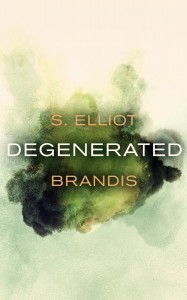 Degenerated by S. Elliot Brandis
Degenerated by S. Elliot Brandis
Humanity is divided.
In the tunnels, beneath the city…
Flynn was imprisoned at birth, spurned by society because of his differences. By age thirteen he was ready to die. By all accounts he should have.
Now he lives amongst those who’d wish him dead, struggling to understand the affliction that saved his life. Life in the tunnels is dark and twisted. He must find a way to make things right.
On the surface, in a sun-scorched wasteland…
Pearl lives in a camp of survivors, learning to adapt to the hostile climate. The mood has begun to darken. Bad habits and dangerous ideas are infiltrating her people.
When the camp decides to attack the tunnels, she faces a choice: will she do as she’s told and stay safe, or risk her life to save a society of people she doesn’t understand.
DEGENERATED is the second novel in The Tunnel Trilogy, following Irradiated.
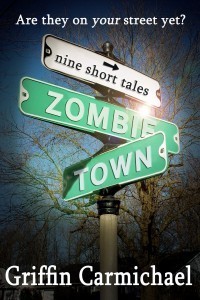 Zombie Town by Griffin Carmichael
Zombie Town by Griffin Carmichael
From city to suburbia, zombies are all the rage as they rampage on their quest for sustenance, taking down strangers, friends and neighbors alike, without pity or remorse.
Here are nine short stories about the times when the dead walk and the living fear.
MY BIG FAT ZOMBIE APOCALYPSE: What better place to be when the dead rise than the local fitness center.
THERE’S SOMETHING ABOUT CAROL: Suburban life can be deadly dull. Or maybe just deadly.
FIGGY PUDDING: Holidays are known for feasting and jubilation, but one restaurant manager comes to regret keeping the doors open one Christmas eve.
NEITHER RAIN NOR: Public servants are said to be a dedicated lot, but carrying on with business as usual after the zombie apocalypse is taking it a bit too far.
SILENT: Little children look forward to a visit from Santa with great anticipation, but there’s nothing good coming down the chimney this year.
DARKNESS FALLS: Even a sturdy fallout shelter isn’t any protection when the super flu everybody’s been predicting lays waste to the world.
FLASHLIGHT: All she wanted was a flashlight so she could see what all the ruckus outside was about. Sometimes it’s better to remain in the dark.
IN THE MEADOW: Winter has come to a small Nebraskan town, bringing huge snowfalls. But nobody is in the mood to build a snowman.
RITUALS FOR THE LIVING: Long after the dead have risen, the survivors learn to cope with new ways of living and dying.
She just lost her heart to the ocean…
Ex-hacker, Cassie Easton, has just made out with her boss—mistake #1. And he’s just told her he’s engaged—mistake #2. She thinks her heart might have just been shredded for good.
The idea of going back to work with him after that is humiliating enough, but things just keep getting worse. Sean’s not acting like the man she knows and loves. She barely recognizes him anymore. Something fishy is going on, and Cassie reverts to her criminal ways to find out why sexy Sean O’Callaghan is dating an old trout and running scared.
When it turns out to be the mystic forces of the ocean that’s screwing up her love life, she wonders if she’s finally lost her mind. If she can just survive a wasted wizard, a jealous sea witch and Selkie lore, maybe she’ll get to fall in love, assuming she doesn’t get arrested first.
Selkie is the first book in The Celtic Witches series.
 Hidden Intentions by Stacy Claflin
Hidden Intentions by Stacy Claflin
Fun-loving Clara is keeping a dark and deadly secret from William, the love of her life.
Not because she wants to hide things from him, but because her story is so unbelievable he will probably think she’s crazy.
If she tells him, she could lose him. If she doesn’t tell him, she will.
This is a standalone novel loosely connected to The Transformed series. And yes, it’s speculative fiction.
Vampires, werewolves, and serial killers, OH MY!
Eight years after the attack that changed her life forever, Riley Cray is confronted with something she never thought she’d have to face again: Samson Reed, the werewolf who nearly killed her, has escaped from prison. With the help of Special Agent Darius Holbrook, Riley is racing against time to stay one step ahead of the crazed werewolf. But Reed isn’t the only monster with his eyes on Riley and as the bodies are piling up she’s beginning to wonder how long it will be before she’s one of them.
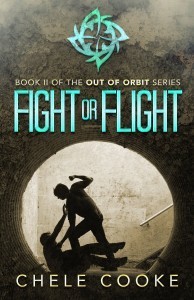 Fight or Flight by Chele Cooke
Fight or Flight by Chele Cooke
A single secret might change a war, but a lie can destroy those fighting it.
Georgianna Lennox’s biggest fear has become reality: she has been sold as a slave. Caught in the middle of the brewing war between the Adveni oppressors and Belsa rebels, she is recruited to be the rebels’ eyes behind enemy lines.
As the Belsa make bolder attacks against the cruel Adveni, Georgianna finds that the lies she is tasked to tell her owner are nothing compared to the secrets she must keep from her friends – secrets that could change the war in their favour, and lies that might destroy them all.
Part 2 in the Out of Orbit series, following Dead and Buryd, which is free right now.
 The Girl Who Believed in Fairy Tales by Heidi Garrett
The Girl Who Believed in Fairy Tales by Heidi Garrett
Heidi Garrett has written a lyrical collection of short stories woven with the threads of three very poignant fairy tales that pull this literary tapestry together to create a shimmering picture of love and acceptance.
THE GIRL WHO WATCHED FOR ELVES desperately needs to find her elf–it’s her only hope for happiness and, ultimately, survival.
THE GIRL WHO DREAMED OF RED SHOES is slowly dying inside until she learns that nothing is right until it’s the right fit–and in vivid, living color.
Lastly, THE GIRL WHO COULDN’T SING has to step out into her dream or she’s going to die with her song hidden inside her heart.
Anyone who misses these tales, will miss the experience–no, transformation of a lifetime. It’s time for everyone to get their real on!
Jodi is in love. The problem is that she’s in love with her best friend, Tanya. And her best friend is in love with Roger. Even worse, they’re getting married. As her friend prepares for a big wedding combining her Japanese and American traditions, Jodi finds herself praying to a long lost Japanese goddess for help.
When the goddess answers, Jodi is faced with a terrible choice. She can either have passion and heartache, or she can have friendship and loneliness.
Wishes always come with strings attached.
Bonus short story: Reflections of Chi
Geneva Lin runs a respectable interior decorating business. Her orderly world turns to chaos when a woman barges in, insisting that her house is rearranging itself. Geneva only hopes a little Feng Shui will solve the problem.
The question is, what do you do with a house that may want to kill you?
 Warbound: The Shield Maiden by C.P.D. Harris
Warbound: The Shield Maiden by C.P.D. Harris
A LOST CONTINENT. A LEGION IN PERIL. THE FATE OF TWO EMPIRES.
In the Domains of the Chosen magic is power.
The Grand Championships are over. Two Gladiators have joined the ranks of the immortal rulers of the Domains. As Gavin and Sadira learn their way as Chosen, their friend, Vintia sets sail with an expedition that will reshape the future of the empire. Chosen Brightloch has found the way to Ithal’duin, a continent lost since The Reckoning. New allies, and new dangers await. Fortunes will be made and the balance of power will shift. It is up to Vintia and the Ninth Legion to safeguard this expedition. Yet, while the Legions faces strange foes, the politics of the Chosen might present an even greater danger.
This is the third book in the Domains of the Chosen series, following Bloodlust: A Gladiator’s Tale and Bloodlust: Will to Power.
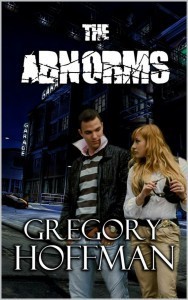 The Abnorms by Gregory Hoffman
The Abnorms by Gregory Hoffman
The world thinks they are useless.
Society thinks they are freaks.
They are Abnorms.
People born with special powers that set them apart from normal humans. Abnorms with useful or dangerous powers are snatched up by the government and never seen again, those with powers deemed useless are set free, back into a population that hates and shuns them. This is a story about a group of so-called useless Abnorms but these teens must do their best to make their useless powers useful as they try to rescue one of their own from the clutches of the government, and maybe fall in love along the way.
 Heir’s Revenge by Patty Jansen
Heir’s Revenge by Patty Jansen
If Miran had princesses, Ellisandra Takumar would be one. Smart, pretty, engaged to a high-profile man, everything a high-class Mirani woman should be. But things are not well in Miran. Many years of boycotts have taken their toll on society, and the regime becomes more desperate to keep its citizens under control. Revolt is brewing. As director of the state theatre, Ellisandra has been asked to stage a violent traditional play which stands stiff with threatening political messages for the populace. She hates it, but speaking out would risk that she’d be cast out from the only world she’s ever known.
Next to her house is the burnt ruin of the house of another high-class family, the Andrahar family. They fled Miran for political reasons when Ellisandra was a little girl and the house has lain untouched ever since. One night, she spots a mysterious young man walking around the yard, putting out pegs and pieces of string. He’s re-building the house. That makes no sense, because the family is no longer welcome in Miran, and who is he anyway?
She is curious and investigates. He seems too good-natured and naïve for his own good, so rather than telling her brothers, she tries to shield him from her own society. And so starts the slide that leads to her being cast out from the only life she’s ever known.
This is the final book in the Return of the Aghyrians series, following Watcher’s Web, Trader’s Honour and Soldier’s Duty.
 Mission: Flight to Mars by V.A. Jeffrey
Mission: Flight to Mars by V.A. Jeffrey
Bob Astor is a Quality Assurance agent working at Vartan Inc. Lately his days have been stressful, to say the least. Butting heads with upper management has put his career on life support. A surprising change in circumstance has Bob going on a business mission to the moon city, Langrenus. On the way, he meets one of the delegates on board the Starbird, a desperate man with a dark past and a very dangerous secret. Through a mysterious series of events Bob finds himself in the middle of an interplanetary crises that no one knows about. These secrets could change – or destroy – all human life on Earth. The key to the answer of the crises is on the Red Planet, Mars. It’s up to Bob, the burnt-out Q. A. agent to rise to the occasion and stem the dangerous tide coming from beyond the solar system.
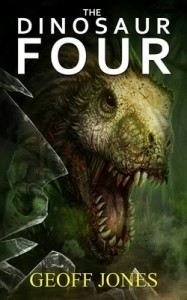 The Dinosaur Four by Geoff Jones
The Dinosaur Four by Geoff Jones
They came for the coffee and wound up in the Cretaceous.
A ticking sound fills the air as Tim MacGregor enters The Daily Edition Café, hoping to meet his new girlfriend for coffee. Moments later, the café is transported 67 million years back in time, along with everyone inside.
As Tim and the others try to find out what caused the disaster and how to get home, one survivor plots to keep the group trapped in the past, in a world filled with prehistoric monsters.
Once a Prince, now a slave. Once a torturer, now a liberator. But still his transformation is nowhere near complete…
Saul Baz Sharmoun has been holding onto something lost to many of his fellow slaves: hope and a desire for justice. A fire was set ablaze within him, growing brighter with each of the twelve years since the Emperor slaughtered his family, and he knows the time to escape his shackles – and to free his people – is now. With his hunger for retribution fueling him, Saul begins an epic journey, searching for his brother and looking to rebuild a world that would allow the crown in his family’s name to rise from the ashes.
But the road to justice is never a straight one. Saul and the uncertain allies fighting alongside him find themselves up against a much greater enemy than they could have imagined. If he is to emerge victorious, he must fan the flames in his heart, and never allow himself to forget that he will stop at nothing to see this done…no matter how much blood must be spilled along the way.
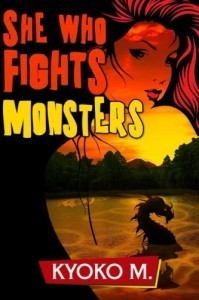 She Who Fights Monsters by Kyoko M.
She Who Fights Monsters by Kyoko M.
Jordan Amador. 23. New Yorker. Waitress. Investigator for souls with unfinished business, also known as a Seer. Michael O’Brien. 25. New Yorker. Lead guitarist. Commander of Heaven’s Army. The dynamic supernatural duo is in the middle of trying to solve a deadly case. Someone is methodically hunting down and murdering Seers one by one. After six months with no leads on the killer, Jordan and Michael are forced to work with their worst enemy—the archdemon Belial: a self-professed Prince of Hell who is dead set on stealing Jordan for himself. However, with the archdemon’s help, they pick up on the trail of the serial killer and plan to stop him no matter what the cost. When the shocking truth behind the murderer’s identity is revealed, Jordan begins asking herself if she is still fighting for the good guys or has she become one of the monsters she is desperately trying to stop?
This is the third part in a series, following The Black Parade and The Deadly Seven.
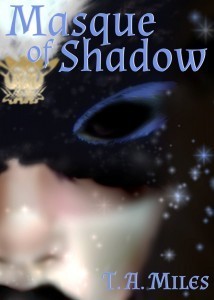 Masque of Shadow by T.A. Miles
Masque of Shadow by T.A. Miles
Heartbroken over the premature death of her young sister, Estelle conceives a dark plan to recover Lunette’s innocent soul from the thief she witnessed taking it. The price is higher than she anticipated, reaching far beyond the loss of her own innocence when she enters voluntarily into the realm of the Lord of Shadows, into a theater of madness constructed by the souls of the dead.
This is a short story. Contains violence, mild gore, sexuality, and thematic elements
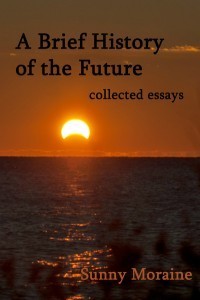 A Brief History of the Future – Collected Essays by Sunny Moraine
A Brief History of the Future – Collected Essays by Sunny Moraine
As an author, scholar, and essayist, Sunny Moraine has mused on a variety of things in a variety of ways. In this collection, spanning over two years of work, they make their way through thoughts on the form and business of writing, the nature and meaning of games, the interweaving of society and technology, and the anxieties, awkwardnesses, and hopes of the everyday.
Gently humorous, self-deprecating, and occasionally painfully honest, these essays offer a journey through a process of body, heart, and mind, and hints of what waits beyond.
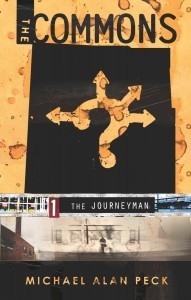 The Commons: Book 1: The Journeyman by Michael Alan Peck
The Commons: Book 1: The Journeyman by Michael Alan Peck
“Paul Reid died in the snow at seventeen. The day of his death, he told a lie—and for the rest of his life, he wondered if that was what killed him.”
And so begins the battle for the afterlife, known as The Commons. It’s been taken over by a corporate raider who uses the energy of its souls to maintain his brutal control. The result is an imaginary landscape of a broken America—stuck in time and overrun by the heroes, monsters, dreams, and nightmares of the imprisoned dead.
Three people board a bus to nowhere: a New York street kid, an Iraq War veteran, and her five-year-old special-needs son. After a horrific accident, they are the last, best hope for The Commons to free itself. Along for the ride are a shotgun-toting goth girl, a six-foot-six mummy, a mute Shaolin monk with anger-management issues, and the only guide left to lead them.
Three Journeys: separate but joined. One mission: to save forever.
But first they have to save themselves.
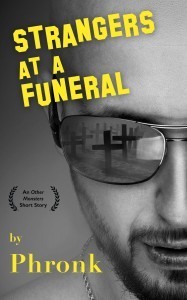 Strangers at a Funeral by Phronk
Strangers at a Funeral by Phronk
Brandon notices them at his grandpa’s funeral first: a pair of men in sunglasses who nobody seems to know. They’re not family, they’re not friends, they’re just … there. No big deal, until they show up again at the next funeral. Drawn into a world of funeral selfies and burial crashers, Brandon needs to know what these strangers want from the dead.
Only problem is, nobody gives a crap except him, and his school frowns upon skipping classes to watch people get buried. His sanity can’t take many more funerals, and those bulges under the strangers’ coats probably aren’t concealing anything pleasant.
Strangers at a Funeral is a 5500 word (22 page) short story.
Far in the future, night never ends.
Cedar, a young man, wakes up with a mysterious electric kit embedded in his chest.
Doctors force Cedar to Mortem– a place where Citizens embrace stinging lights of an electronic city, never sleep, and depend on liquid called Lixir to keep them happy.
Cedar, who has little memory, feels strange– he senses there is something more to life than drinking hallucinogenic Lixir and working a tedious job.
Cedar’s dreams begin to uncover what used to be. He remembers more and more about the past and he realizes that there may be life beyond Mortem.
As Cedar shares his memories and begins to ask more questions, he becomes the target of the government.
Cedar is faced with either conforming to Mortem’s culture or trying to escape with his life.
 Send to Kindle
Send to Kindle
July 29, 2014
New Crime Short Two-pack available: Seeing Red
I did another eight-hour e-book challenge and here is the result, a crime short two-pack about bad relationships leading to murder called Seeing Red.
There is some more information about the process of writing Seeing Red over at the Pegasus Pulp blog. And in case you’re wondering why I waited until now to announce a story that went live more than a week ago, I wanted to wait until the story was available at all major stores and particularly Apple tends to be slow. What is more, I’m trying to space out the promotional posts and there have been a few of late.
So here it is: Seeing Red
Two tales of bad relationships, angry women and murder
Seeing Red
It was supposed to be just sex. But then Dan gradually wormed his way into Maggie’s life and into her apartment. And though Dan insists that he loves her, Maggie suspects he is far more interested in her sixty inch plasma screen.
Living together brings out the vast differences between Maggie and Dan. And so Maggie’s patience is stretched to a breaking point to a breaking point, until an argument about pasta sauce and Dan’s addiction to ketchup lead to murder…
Third Time Lucky
Hilda’s abusive husband Walter has already survived two massive heart attacks. But the third time’s a charm… or is it?
For more information, visit the Seeing Red page.
Buy it for the low price of 0.99 USD, EUR or GBP at Amazon US, Amazon UK, Amazon Germany, Amazon France, Amazon Spain, Amazon Italy, Amazon Canada, Amazon Australia, Amazon Brazil, Amazon Japan, Amazon India, Amazon Mexico, Kobo, Barnes & Noble, Apple iTunes, Casa del Libro, Scribd, Inktera, txtr, Thalia, Weltbild, Hugendubel, Der Club, Libiro, Nook UK, DriveThruFiction, OmniLit/AllRomance e-books, Flipkart, e-Sentral, You Heart Books and XinXii.
 Send to Kindle
Send to Kindle
July 27, 2014
The Speculative Fiction Blog Hop
Over at KBoards, a couple of indie spec fic writers got together and organised the Speculative Fiction Blog Hop, a variation of the popular Writing Process Blog Tour. Every participant answers four questions about our process and then hands on the baton to the next writer.
I’m up today, taking over from Jessica Rydill, author of Malarat and Children of the Shaman. Here is her bio:
Jessica Rydill writes fantasy and collects Asian ball-jointed dolls. This makes her living room an unnerving place to visit.
Many of the dolls are based on characters from her books. The bad guys stay locked in the cabinet.
Jessica wishes she could write like Russell Hoban. In the mean time, she has got a crossover going on between mediaeval fantasy with warlords, and steampunk adventure with lightning-wielding shamans. Plus Golems, Dybbuks, Kabbalistic demons and other nasties from Jewish folklore.
And now it’s time for the questions:
What are you working on?
On the speculative fiction front, I finally finished Debts to Pay, a new Shattered Empire novella focussing on the character of Carlotta Valdez, which is currently going through editing. I even found the perfect cover image, which looks just like I imagine Carlotta. I’m also working on another Shattered Empire novella, Shot at Dawn, which should come out later this year and puts Holly and Ethan into deep trouble.
On the non-speculative front (yes, I work on multiple projects simultaneously), I’m working on Little Girl Lost, part two of my romantic suspense series New York City’s Finest, as well as on a short holiday romance called Lonely this Christmas. Now writing a Christmas story in July is somewhat weird, but you have to start early in order to have it published in time for the holidays.
How does your work differ from others in its genre?
I believe that our writing is the sum of our influences. Now authors are different people from different backgrounds, with different experiences and preferences. And since those backgrounds, experiences and preferences influence our writing, it naturally follows that our work is different from the work of all those other authors.
According to Amazon’s author rank, there are approx. 22000 speculative fiction authors out there. However, none of those other 22000 speculative fiction authors has had exactly the same experiences growing up, worked the same jobs, read the same books, watched the same movies and TV shows. In fact, approx. 21950 of them don’t even live in the same country as me.
Why do you write what you do?
I read in multiple genres. And since I write what I like to read, I consequently also write in multiple genres.
However, speculative fiction has always been my first literary love, since it was the genre I latched on to, when I grew out of children’s books and made the switch to adult books (there was very little YA in those days and ever less worth reading). In particular, I fell in love with science fiction, mostly Golden Age classics as well as some 1980s works. So it made sense that I would write in the genre as well. Indeed, my first attempts at writing a novel was science fiction.
I like all subgenres of science fiction and have tried my hand at writing many of them, though space opera was always my first love. What is more, there is one crucial ingredient that can be found in all the science fiction I’ve loved in my life and that is rebellion, to the point that “rebellion against an unjust system” was part of my personal definition of science fiction for years. If a book managed to combine space opera, a sprawling galactic setting, lots of female character who kicked butt and rebellion against an unjust system, it was pretty much catnip to me.
Since I really loved space operas about plucky rebels fighting against an unjust system, it was only natural that I would try to write one of my own. And I did, as a teenager making my first attempts at writing. Alas, the result – a massive sprawling mess called the Femla series – was illogical, chaotic and frankly unpublishable and borrowed quite liberally from Star Wars as well as anything else that caught my fancy.
Eventually I grew up and recognized the Femla stories for what they were, namely an unholy mess. I also got on the Internet and found other science fiction fans, for the first time in my life. Alas, I also learned that the kind of science fiction I liked was considered hopelessly old-fashioned and found that I didn’t much care for the sort of science fiction that was considered hip. All this led to a massive creative paralysis, which caused me to abandon the genre I loved most in favour of other genres I also liked. At around the same time, I started selling short fiction in genres other than SF and decided I simply wasn’t fated to be an SF author.
Indie publishing changed everything, because it meant that suddenly I had the freedom to write what I wanted and publish it. And so, after dipping my toes into the indie pool with some backlist stories, I decided to try my hand at space opera again with all the elements I liked so much. Hence, Shattered Empire was born, the story of the Great Galactic Rebellion, told through the eyes of the people who fought it.
Meanwhile, the Silencer series was born out of my interest in the pulp magazines of the 1930s and my admiration for the authors who wrote for them. Because the old pulp authors had a work ethic like nobody’s business. For example, Walter Gibson, the man who created The Shadow, would write a short novel of approximately 40000 words every two weeks. And the results are still entertaining today, almost eighty years after they were written. In pre-indie publishing days, prolificness on the scale of Walter Gibson was pretty much unheard of, though now there are indie writers who come close to matching the work ethic of the old pulp scribes.
When I created the Silencer, I initially wanted to try my hand at writing like the old pulp authors did, loosely connected series adventures with a single heroic protagonist written at a fast pace. So I created a character patterned after the pulp heroes of the 1930s like the Shadow, the Spider, Doc Savage, Operator 5, etc…, only with a twist cause in his civilian identity the Silencer actually is a pulp writer. Of course, I didn’t manage to write as quickly as Walter Gibson, though I consider myself reasonably prolific. But I still enjoyed creating the Silencer and his supporting cast.
There are similar stories behind all of my works. For example, my crime shorts were inspired by the short crime stories that could be found in the backpages of many German magazines when I grew up. My historical romances were inspired by reading Anne Golon’s Angelique saga in my teens and watching a whole lot of French and Italian made historical movies on TV. New York City’s Finest was inspired by the sexual tension laced crime dramas that were so popular in the 1980s. Rites of Passage and Cartoony Justice feature characters I invented back in my early teens.
How does your writing process work?
I am what is commonly called a pantser. I usually have at least a vague idea of where a certain story is going, but I don’t use outlines. Most of the time, I have a flash of inspiration – a scene, an image, an idea – and simply start writing and see where it takes me.
For more complex stories, i.e. novella and novel length, I sometimes create a rough outline, when the story is approx. three quarters finished, by scribbling brief scene descriptions on notecards and shuffling them around to determine which order they go in.
In case of a continuing series like Shattered Empire or New York City’s Finest, I also have a rough series outline as well as a sort of series bible listing characters, settings, plot highlights, etc… The Silencer is a bit different, because the individual adventures are self-contained without an overarching plot. But I still have a series bible to collect information on characters, setting, equipment, etc… as well as notes for future adventures.
I write every day, including weekends and holidays. The absolute minimum wordcount goal I’ve set myself is at least 100 words of new fiction per day. Since I started tracking my wordcount back in 2005, I’ve missed my 100 word goal only once, when I was sick with the flu. However, these days I aim for writing at least thousand words every day, divided between several projects. I frequently exceed that wordcount goal, though sometimes I fall short as well.
I used to think that I needed a solid block of at least half an hour free time in order to write. Eventually, inspired at least partly by Dean Wesley Smith, I started writing in shorter bursts. Whenever I have a few minutes of free time, I write, even if it’s only a sentence or two. Cause even these few sentences do add up over time. I also carry a pen and a notebook wherever I go and use dead bits of time – waiting at the tram station or the doctor’s office or some downtime at school – to jot down a few sentences. Using every bit of free time to write has boosted my productivity enormously.
As I said above, I usually work on several projects simultaneously and cycle through them, so that if I get bored or stuck on one project, I can jump to the next one. This approach usually works quite well for me, though it can take longer for an individual project to get finished. However, earlier this month I found myself finishing several stories in quick succession and thus ran out of projects to work on. The solution was going through my folder of unfinished stories and picking one or two to continue.
***
Okay, that’s it from me. Next up is Kevin Hardman who writes some kick-arse superhero fiction. Here is his bio:
Kevin Hardman is an avid reader who made the mind-boggling decision to cross trade lines and become an author about a year ago. He is the author of the Kid Sensation series and the Warden series.
Make sure to check out his blog on August 4 for the next stop on the tour.
 Send to Kindle
Send to Kindle
July 23, 2014
Dog Days Linkdump
It’s the Dog Days of summer, the hottest and sultriest time of the year, and also the time when supposedly there are more serious disasters and tragedies than usual. Thankfully, the dog days don’t always live up to this particular aspect of their reputation, but sadly this year they do.
And now for some links:
First of all, I’ve been interviewed by fantasy writer K.J. Bryen at Take the Plunge. We talk about writing, UFOs and pirates – the seafaring kind, not the kind that illegally shares digital media.
I also made a trio of posts over at the Pegasus Pulp blog, explaining why my e-books won’t be available via Amazon’s new Kindle Unlimited program, collecting other reactions to Kindle Unlimited from around the web and finally linking to some prime Amazon bashing from Germany.
In the speculative fiction community, the big topic is the decision of the WisCon committee to only provisionally ban former editor Jim Frenkel for four years after several incidents of sexual harrassment. Natalie at The Radish has the full scoop.
The Guardian has an interesting article about how the comment sections of articles about the conflict in Ukraine and recently the flight MH17 tragedy are flooded by pro-Russian comments and wonders whether this is an orchestrated social media campaign. I’ve been noticing a similar phenomenon in the comment sections of the German media. Lots of pro-Russian and anti-Ukrainian comments, accusations of bias, similar wording (“murderous militias of Maidan” is a popular one) and often a liberal dose of anti-Americanism, too. There has been surprisingly little reaction to this in the German media, which is odd, considering it’s happening right in their comment sections and on their own Facebook pages. Here is a rare German language report on the phenomenon from kulturzeit. Comments are screened BTW.
John C. Wright claims to have found the secret to mindblowing perfect sex. The rest of the world begs to disagree.
German radio and TV personality Manfred Sexauer died Sunday aged 83. From the mid 1960s on, Manfred Sexauer introduced international pop music on the very conservative German public radio, which was something of a scandal at the time. Later, in the 1970s and 1980s, he hosted the popular music program Musikladen on TV, where pretty much all of the big names of the era performed live.
I’ve seen a lot of Musikladen episodes over the years, both live and later as repeats. As music programs go, it was unique with its mix of comedy, political cartoons, international top acts, GoGo dancers (often topless in the early years) and early electronic effects. Here is the opening of the first Musikladen episode ever featuring Manfred Sexauer and co-host Uschi Nerke and here is a typical episode from the disco era (1980 in this case). Musikladen eventually became a casualty of MTV like most of programs of its type, though it survived in some form well into the 1990s on TV and to this day on the radio.
Finally, here is Manfred Sexauer in 1980 together with a very young Thomas Gottschalk and Frank Laufenberg rapping to the beats of the Sugar Hill Gang’s Rapper’s Delight (which had been performed live on Musikladen sometime before, though I couldn’t find the video). This piece was actually the first German language rap song ever.
Last but not least, here is a signal boost: Speculative fiction small press Hadley Rille Books is running an Indiegogo campaign to allow them to expand their operations.
 Send to Kindle
Send to Kindle
July 21, 2014
Prometheus and the problem with prequels
Ridley Scott’s Prometheus (2012) was on TV yesterday. Now after seeing the bad reviews this film got at the time, I bumped it down from “Head for the cinema now” right past “Get it on DVD” to “Watch when it’s on TV”. And now Prometheus came to TV, I finally did watch it.
Now given that a whole lot of smart people really really hated Prometheus, sometimes so much they posted several times how much they hated it, I expected a feat of truly epic badness.
However, Prometheus is not a feat of truly epic badness. Instead, it’s just a rather meh movie with some pretty bad science. So “meh” in fact that more than twice as many German viewers preferred to watch a rerun of the German crime drama Tatort (Crime Scene) instead.
Spoilers behind the cut, provided you need a warning for a two year old movie.
The Good: Prometheus certainly is a nice looking movie, but then it should be, given the enormous budget and current state of effects technology. The cast is solid, particularly Michael Fassbender and Idris Elba, who as usual steals the movie. In fact, if there was one thing that would have massively improved Prometheus, it would be more Idris Elba and less drippy boyfriend of Noomi Rapace. And please shorten the sex scene between Rapace and her drippy boyfriend and give us Idris Elba in bed with Charlize Theron instead.
The Bad: The science is absolutely atrocious and much of the plot hinges on the fact that the characters are all idiots who seem to have slept through their science classes and health and safety instruction and who have never seen a single SF film in their lives either.
In many ways, the movie is also predictable as hell. I mean, was anybody at all surprised that David as played by Michael Fassbender turned out to be treacherous? He’s an android in a Ridley Scott movie, so of course he’s going to be treacherous (and gets his head ripped off). In the end, the only survivor is a young woman – come on, we’ve all seen Alien. As for the reveal that Charlize Theron’s character was the daughter of the man who financed the mission a.k.a. Guy Pearce in old age make-up – I called that one right from the beginning, though I wasn’t sure whether I called it because the connection was so obvious or because I subconsciously remembered that tidbit from the various negative reviews.
However, plenty of extremely popular SF films have atrocious science. Star Wars, the Star Trek reboot, Transformers, Independence Day, Armageddon and every superhero film ever have science that is even more ridiculous than that in Prometheus. And plenty of movies have plots that are driven by the incompetence of many or most characters.
Take for example the biggest hit (in the US at least) of 2012, the same year Prometheus was released, namely the mighty Avengers. The science in The Avengers makes even less sense than that of Prometheus – it’s basically a movie about a glowing magical Macguffin that opens a portal into outer space. As for idiocy and incompetence, pretty much everything that happens in The Avengers can be blamed on the rank incompetence of SHIELD (with some contribution by Odin Allfather’s crappy parenting skills) – and that was before we knew that approx. half of them were really HYDRA operatives. Yet The Avengers is widely (and rightfully) beloved, while Prometheus is reviled with a passion usually reserved for the likes of Sharknado. So why do so many people hate Prometheus – a completely average and forgettable movie – so much, while they are willing to forgive the exact same sins in many other films?
Initially I assumed that the extreme problems many people had with Prometheus was due to the religious content. After all, the movie might be considered to endorse the idea of intelligent design with the “alien kickstarts development of life” scene at the very beginning. And then there is the fact that Noomi Rapace’s character is openly religious and wears a big silver cross around her neck. There is also some religiously flavoured debate about whether David the android has a soul as well as about the relationship between creator and creation.
Now I’m not religious and generally prefer my SF free of religion as well. In particular, I can’t stand theological discussions in my SF. However, the religious aspects in Prometheus did not bother me in the slightest. Of course, the whole “ancient astronauts as gods and bringers of life” concept is bunk, but concepts that are bunk can still make an enjoyable basis for fiction. Nor do I mind religious characters. Some people are religious, so it follows that some fictional characters will be religious as well. Besides, I viewed the attachment of Noomi Rapace’s character to her silver cross as well as her need to know who made humanity less as religiousness and more as the result of her missionary father’s untimely death. After all, we see in a flashback scene that the cross was a present from her late father*. As for the religiously flavoured debates between the characters, the average episode of the new Battlestar Galactica (which was inexplicably popular with the sort of people who hate Prometheus) had a lot more tedious philosophizing and theologizing than Prometheus).
Besides – and a lot of people seem to have missed that bit – the plot proves the various religious theories in the movie wrong. The alien gods want to destroy their creation and kill us all. Guy Pearce’s character realizes with his dying breath that “there is nothing”, i.e. no afterlife. And David, the supposedly soulless android, is not just the most developed character in the entire film (it’s telling that I can remember his name, but not that of the other characters), but also clearly has feelings, including a creepy infatuation with Noomi Rapace’s character. Hell, he even murders her boyfriend.
So what precisely was it that had so many people so upset about Prometheus, when it was no better or worse than a dozen other forgettable SF films? I guess in the end Prometheus was a victim of its overblown expectations. Because to those who were eagerly awaiting the release of Prometheus in the summer of 2012, it wasn’t just another SF film. No, it was a serious SF film in a sea of vaguely SFnal summer blockbusters. What is more, it was Ridley Scott’s return to the genre that had made him famous for the first time in thirty years. Finally, it was supposed to link Alien and Blade Runner together.
When weighed against those expectations, it’s obvious why Prometheus had to disappoint. For while viewers might be perfectly willing to accept bad science from Star Wars or The Avengers, Prometheus positioned itself as a serious SF film along the lines of 2001/Solaris/Gravity and we expect better from those. And in spite of the pretty visuals, Prometheus looks and feels a bit old-fashioned, more like a film from the 1970s than a film from the 2010s. It’s an Alien prequel, all right, but it feels like an Alien prequel made in approx. 1975 before Alien came out, rather than in 2012. Which means that it as a prequel it was actually more successful than the Star Wars prequels, which often seemed more like generic 21st century summer blockbusters than prequels to the Star Wars films we all know and loved.
And while the Alien prequel bits were among the better aspects of the movie, they only worked if you had seen Alien fairly recently. For example, the person with whom I was watching the film hasn’t seen Alien in twenty years and only remembered it as “that film where the monster bursts out of that guy’s chest and kills everyone”, so the Alien references were completely lost on them.
It doesn’t help that Prometheus has more than its share of plotholes and doesn’t even answer many of its own questions. For while the movie does offer a satisfactory answer to the question, “Why did the Engineers create humanity?”, namely the “Because they/we could” that Noomi Rapace’s drippy boyfriend offers to David, it never answers the question why they wanted to destroy us. Nor did the film answer the question why the various glyphs pointed at what seemed to be a random military base rather than the Engineer’s homeworld. And what was the lifeform that flickered in and out in one of the tunnels? And while we do get some kind of answers regarding the origin of the Aliens from the eponymous film series – apparently they were a bio-weapon created by the Engineers to wipe out humanity – the connection between the leaking urns, the wormlike things in the cave, the octopus/facehugger like thing in Noomi Rapace (and how did it grow so big anyway?) and the Alien that bursts out of the Engineer’s chest in the last shot is vague at best. Never mind that I for one never wondered where the Aliens came from – they just existed and didn’t need an origin. Which sums up why prequels rarely work. Because most of the time, prequels answer questions that no one ever asked.
Finally, it might be time to admit that just maybe Ridley Scott himself is somewhat overrated. True, he made two seminal SF movies more than thirty years ago. But since then? Sure, Ridley Scott made a lot of movies. Several of them were successful and won awards. But which of his post-Blade Runner movies have really held up? Gladiator maybe, though I for one never got the love for Gladiator, because IMO it’s a fundamental misunderstanding of what made sandal epics fun. Ditto for Scott’s Robin Hood, another film which takes a fun genre and sucks all the fun out of it.
And even the appeal of Alien and Blade Runner is beginning to fade. Blade Runner gets worse with every new director’s cut that is released. It’s also a rather incoherent movie, a problem that it coincidentally shares with Prometheus. Alien holds up somewhat better and tells a coherent story. Nonetheless, I find that I no longer stop and watch when I come across the film on late night TV and that I haven’t actually watched it in at least 15 years. What is more, I’m beginning to wonder whether the fact that Alien works is more due to screenwriter than to Ridley Scott. And I suspect that if Dan O’Bannon had lived to write the script for Prometheus, it would have been a better movie.
Now Ridley Scott is still a director with a strong visual flair, which is apparent in Alien and Blade Runner and Prometheus and Black Rain and many others. However, he clearly needs a decent screenwriter, someone with the skills of Dan O’Bannon.
*BTW, has anybody noticed that there are no mothers in Prometheus? Both Noomi Rapace’s and Charlize Theron’s character have daddy issues, but no mother present at all. Plus, Ridley Scott once again demonstrates his issues with pregnancy by having yet another character implanted with a rapidly growing alien fetus.
 Send to Kindle
Send to Kindle
July 18, 2014
Austrian SF legend Dietmar Schönherr dies
Austrian actor and television personality Dietmar Schönherr died yesterday aged 88. Here are two obituaries from Die Welt und Der Tagespiegel as well as a video obituary courtesy of kulturzeit.
In spite of the surfeit of world news on this day, all news and cultural programs made room for tributes to Dietmar Schönherr. However, most of them focussed mainly on his time as a host of game and talkshows in the 1970s as well as on his humanitarian work (more on that later). And indeed Dietmar Schönherr introduced the talkshow to German television in 1973 (we shall forgive him for that, for he knew not what he wrought). And Wünsch Dir Was (Make a wish), a gameshow Schönherr hosted together with his wife Vivi Bach in the early 1970s caused not one but two TV scandals, when a game got out of hand and nearly drowned a family who had been lowered with their car into a swimming pool and when a when a 17-year-old contestant paraded across a catwalk in a transparent blouse (mild nudity alert). Particularly the transparent blouse is something of a giggler today, since only a few years later, such blouses were normal everyday wear. My Mom had a very similar blouse in the mid to late 1970s.
Beyond half-drowned families and transparent blouses, Wünsch Dir Was was one of the first interactive gameshows on German language TV. However, in those days before televoting participants in selected towns voted for the winner via switching on the lights in their homes or flushing their toilets! Which is a lot more bizarre than transparent blouses could ever be.
But German SF fans (and even many non-fans) will forever associate Dietmar Schönherr with the role of Major Cliff Allister McLane, commander of the space cruiser Orion 7 in the TV series Raumpatrouille – Die phantastischen Abenteuer des Raumschiffs Orion (Space Patrol – The fantastic adventures of the spaceship Orion).
Raumpatrouille Orion is often called Germany’s answer to Star Trek. But this is wrong, because Star Trek and Orion both debuted within two weeks of each other in September 1966 and thus had to be developed independently of each other. I guess it was a case of an idea that was simply floating around in the Zeitgeist at the time. And there certainly are superficial similarities between Raumpatrouille Orion and Star Trek, since both shows star a spaceship with a multi-national crew and a dashing gung-ho commander. What is more, both shows tackled the social issues of the era, disguised as SF.
IMO Raumpatrouille Orion wasn’t quite as successful as SF as the best of Star Trek, since the SF components were mostly rehashes of well-worn golden age tropes (one episode plays very much like an Asimov robot story). On the other hand, Orion was generally better acted. It also had better and more regular female characters. The regular Orion crew consisted of four men and two women, including the wonderful security officer Lieutenant Tamara Jagellowsk, who is still one of my favourite female SF characters of all time. Female space fleet general (and apparently a former lover of McLane’s) Lydia van Dyke (played by Friedrich von Dürrenmatt’s wife Charlotte Kerr) appeared in several episodes and Margot Trooger guest-starred as the queen of the space amazons (like I said, the series had a thing for hoary tropes). The crew was diverse with regard to nationality and consisted of a Scotsman, a Russian (in the middle of the Cold War!), an Italian, a Swede, a Japanese and a Swiss woman. Alas, Raumpatrouille Orion was a 100% white show due to being made in what was still a very white country. One crewmember, astrogator Atan Shubashi is supposedly Japanese, but played by white actor Friedrich Georg Beckhaus.
Though Raumpatrouille Orion‘s special effects get some flak today, since many of the futuristic machines were assembled from common household devices (the navigation clothes iron is particularly notable), they were outstanding for their time and are lightyears ahead of mid 1960s Doctor Who and even edge ahead of Star Trek at times (though unlike Orion, Star Trek was shot in colour, which is less forgiving of ropey effects).
But what made Raumpatrouille Orion so special were the characters, particularly the Schönherr’s Commander McLane and his security officer Tamara Jagellowsk (played by Eva Pflug), whose sparring and chemistry created enough sparks to power not just the Orion but the underwater base where she was docked when not in service as well. They finally got together in the final episode.
Cliff Allister McLane is basically your typical gung-ho space hero, a guy who goes into danger guns blazing, for whom order are just optional suggestions and who regularly wrecks his spaceship (twice on screen and five times before the start of the series), which gets him demoted to patrol duties in the pilot episode and regularly brings him into conflict with the straight-laced Tamara Jagellowsk. McLane is something of a womanizer, extremely loyal towards his friends and a “rather average kisser” according to Tamara Jagellowsk. In the hands of a lesser actor, McLane would have been a sterotype. Dietmar Schönherr turned him into an icon.
As a product of the 1960s, Raumpatrouille Orion reflects West German anxieties about rearmament following WWII and a deep scepticism not so much towards the military itself (unlike the Enterprise, the Orion is a military vessel), but towards generals with little concern for human lives (McLane repeatedly acts against orders to save lives). Characters like the shouty General Wamsler and the icy intelligence officer Colonel Villa show how the average West German viewed the military, particularly its higher ranks.
Though part of the military himself, our hero McLane is closer to the counterculture of the 1960s. McLane isn’t a pacifist and indeed is perfectly willing to fight the shadowy aliens known only as “the Frogs”. However, McLane is a rebel. Orders are totally optional for him and definitely not to be followed blindly. Indeed, in one episode he berates two of his crewmembers for blindly following one of his order and thus putting themselves into danger. And – sorry Horst Schimanski – but Cliff Allister McLane was the first person to utter the word “shit” on German TV, albeit in adjective form.
Indeed, I can trace many of my problems with the “Rah, rah, space marines” strain of military SF right back to Raumpatrouille Orion. Because after seeing Cliff Allister McLane yelling at two of his crewmen and friends for following his own orders and thus risking their own lives in the process, the blind obedience and “Yes, sir, no sir” attitude of much military SF was difficult to accept.
Ironically, Raumpatrouille Orion caught some flak in the late 1960s from the usual suspects for its military content and was even called “fascistoid” at one point, which was the favourite accusation of certain leftwing pop culture scholars of the time to hurl at any kind of popular entertainment at all. It makes you wonder whether those people ever actually watched the show. But then those are the same people who called Captain America “a fascist idol” (Steve Rogers weeps and Hulk smashes) and who also accused Perry Rhodan, another German space hero, of “fascistoid tendencies”, even though Perry Rhodan allies himself with peaceful aliens against a militaristic Earth in his very first adventure and proceeds to destroy all nuclear weapons on Earth, instantly ending the Cold War by pissing off East and West enough that they unite against him. Fascistoid indeed. To quote Inigo Montoya, “You keep using that word. I do not think it means what you think it means.”
Dietmar Schönherr was as much of a rebel in real life as on the the screen. Though he came from an aristocratic military family and made his screen debut in a Nazi propaganda film, he was active in the peace movement, was arrested while protesting the deployment of nuclear missiles and once called Ronald Reagan an “arsehole” live on TV. He also did a lot of humanitarian work, particularly in civil war-stricken Nicaragua.
As for Raumpatrouille Orion, you do not have to take my word for how good it was, but you can see for yourself, for all seven episodes are available on YouTube. So let’s rewatch a few episodes in memory of Dietmar Schönherr.
 Send to Kindle
Send to Kindle
July 17, 2014
Double Release: A new Shattered Empire novelette and a new Silencer story
The post title says it all really, for today I have no one but two new releases to announce. And not just any new titles either, but a brand-new adventure of the Silencer and the long awaited next installment in the Shattered Empire space opera series.
Let’s start with Shattered Empire. The new story is called History Lesson and that’s exactly what it is, namely Ethan giving Holly a primer on the history of the Fifth Human Empire. In the grand tradition of the space opera genre, any parallels to actual events are total coincidence, of course. And yes, I had a lot of fun liberally borrowing from postwar (West) German history.
History Lessson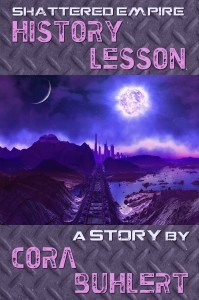 The nights are long on the rebel world of Pyrs, most of the man and women hiding out there have demons that haunt them and everybody deals with those demons in their very own way.
The nights are long on the rebel world of Pyrs, most of the man and women hiding out there have demons that haunt them and everybody deals with those demons in their very own way.
For Holly di Marco and Ethan Summerton, two of the more than two thousand rebel fighters on Pyrs, the best way of staving of the nightmares is arguing about politics, eating sweets and getting drunk, very drunk.
But one long night of arguing about politics reveals some unexpected truths about the history of the Fifth Human Empire… and also about Holly and Ethan.
Find out more here or buy it for the low price of 0.99 USD, EUR or GBP at Amazon US, Amazon UK, Amazon Germany, Amazon France, Amazon Spain, Amazon Italy, Amazon Canada, Amazon Australia, Amazon Brazil, Amazon Japan, Amazon India, Amazon Mexico, Kobo, Barnes & Noble, Apple iTunes, Casa del Libro, Scribd, Inktera, txtr, Thalia, Weltbild, Hugendubel, Der Club, Libiro, Nook UK, DriveThruFiction, OmniLit/AllRomance e-books, Flipkart, e-Sentral, You Heart Books and XinXii.
As for the Silencer, Richard Blakemore’s latest adventure follows him out onto the nocturnal streets of Depression era Manhattan again, where after a long night of crimefighting, the Silencer is called upon to prevent yet another crime. Mean Streets and Dead Alleys is as close to a typical night out for the Silencer as you can get, for not even Richard Blakemore gets to battle master criminals every night.
Mean Streets and Dead Alleys Wounded and weary after a long night of crimefighting, all Richard Blakemore a.k.a. the Silencer wants is to go home. But then he spots a young woman being stalked by three thugs, so the Silencer has to jump into the fray once more. However, when the Silencer follows the woman and her pursuers into a dark alley, he finds far more than he bargained for…
Wounded and weary after a long night of crimefighting, all Richard Blakemore a.k.a. the Silencer wants is to go home. But then he spots a young woman being stalked by three thugs, so the Silencer has to jump into the fray once more. However, when the Silencer follows the woman and her pursuers into a dark alley, he finds far more than he bargained for…
Find out more here or buy it for the low price of 0.99 USD, EUR or GBP at Amazon US, Amazon UK, Amazon Germany, Amazon France, Amazon Spain, Amazon Italy, Amazon Canada, Amazon Australia, Amazon Brazil, Amazon Japan, Amazon India, Amazon Mexico, Kobo, Barnes & Noble, Apple iTunes, Casa del Libro, Scribd, Inktera, txtr, Thalia, Weltbild, Hugendubel, Der Club, Libiro, Nook UK, DriveThruFiction, OmniLit/AllRomance e-books, Flipkart, e-Sentral, You Heart Books and XinXii.
 Send to Kindle
Send to Kindle
July 13, 2014
Germany wins the cup, George R.R. Martin goes Swiss and the last bastion of masculinity falls
First of all, Germany won the 2014 World Cup tonight, making it Germany’s fourth win after 1954, 1974 and 1990.
I watched the match with my Mom (my Dad has caught a cold and went to bed after the regular matchtime was over), a bit annoyed that the match went into overtime, especially since I still had two pages of a very boring and complicated contract to translate (The customer needs it urgently – of course they do). However, the result was more than worth it and the match itself was very good as well, though not as stunning as the semi-finale against Brazil.
One thing that marred the event was that a man was stabbed to death during a fan gathering to watch the match in a cinema here in Bremen.
Switzerland may have gotten kicked out of the World Cup in the round of the last sixteen, by Argentina of all teams (don’t worry, neighbours, you have been avenged), and Swiss authors were given a hard time by the Bachmann Prize jury this year, but Switzerland has one reason to celebrate, namely that George R.R. Martin has graced our multilingual neighbour country with his presence, since he is guest of honour at the Neuchâtel International Fantastic Film Festival.
Now the German language cultural scene likes to pretend that Game of Thrones doesn’t exist, because it’s “just” fantasy and doesn’t have anything to say about the way we live, unlike those other US quality TV shows The Sopranos or Breaking Bad (because the lives of mafia clans in New Jersey or a cancer-struck highschool teacher turned drug kingpin in New Mexico has so much to do with the life of the average German). Honestly, I’ve seen/read interviews with Turkish German actress , who plays Shae, which seemed to consider her role in the German crime drama Tatort the pinnacle of her career and didn’t mention Game of Thrones at all. While you just know that if Ms. Kekilli had been casted to play a terrorist on Homeland or a drug dealer’s mistress on Breaking Bad, the German language cultural press would be all over it.
However, when George R.R. Martin is the guest of honour at a renown SFF film festival, at least our Swiss friends no longer have any excuse to ignore him. And so the Swiss public TV channel SRF offers this profile of the man and the series, while the Zurich based paper Der Tagesanzeiger has interviewed Martin. Der Tagesanzeiger has run background articles and reviews about Game of Thrones, both the TV show and the books, before. Apparently, the deputy head of the culture department is a fan.
Finally, one of the last bastions of masculinity here in Bremen has finally fallen: For the so-called Schaffermahlzeit, a black tie gala dinner for Bremen’s sea captains, merchants and political guests held annually since 1545, has announced that they will finally allow women to take part in the official dinner. Because up to now, female guests – mostly wives and daughters of sea captains or merchants – had to eat in a separate room from the male guests, though they were allowed to take part in the ball afterwards, probably because a ball involving only men would have been a bit strange. An old classmate of mine actually attended the women’s dinner at the Schaffermahlzeit once, accompanying her Dad, and quite enjoyed the experience.
Now there have been female guests at the main Schaffermahlzeit before. A female sea captain has been a regular guest since 2004 (by now, there are two female captains) and Angela Merkel was the first female guest of honour in 2007. But those ladies were exceptions, while the wives and daughters were still stuck in their separate room. But apparently not any longer. Hey, it only took 470 years.
If you’re wondering about the actual meal, it’s chicken soup, followed by stockfish with mustard sauce and potatoes, kale with Pinkel sausage and smoked meat, roast veal with celeriac salad, apples and plums and Riga style turbot with anchovies, sausage, fruit and cheese, most of which sounds rather weird even if you’re from North Germany. There’s also wine and a special sailor’s beer. Oh yes, and smoking is not just allowed but expected, though you have to use a claypipe.
 Send to Kindle
Send to Kindle
Cora Buhlert's Blog
- Cora Buhlert's profile
- 14 followers


